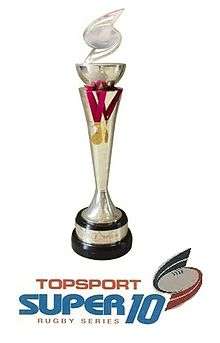Super 10 Rugby
| Super 10 | |
|---|---|
|
Top Sport Super 10 logo used in South Africa from 1993 | |
| Sport | Rugby union football |
| Inaugural season | 1993 |
| Replaced by | Super12 (1996) |
| Number of teams | 10 |
| Country |
Australia (2 teams) New Zealand (4 teams) South Africa (3 teams) Tonga (1 team, 1995) Western Samoa (1 team, 1993–94) |
| Holders | Queensland (1995) |
| Most titles | Queensland (2 titles) |
| Broadcast partner |
|
| Related competition |
|
The Super 10 was a rugby union football tournament featuring ten teams from Australia, New Zealand, South Africa, Tonga, and Western Samoa. The competition ran for three years from 1993 to 1995 and was the predecessor of Super 12 and Super 14, now known as Super Rugby.

History
The Super 10 replaced the Super 6 and the previous South Pacific Championship and CANZ Series tournaments which had been organized by the Australian and New Zealand rugby unions during the 1980s and early 1990s. With South Africa being readmitted into international sport due to the dismantling of apartheid (both The Wallabies and the All Blacks toured South Africa during 1992), there was an opportunity to launch an expanded competition also featuring South Africa's top provincial teams. The South African Broadcasting Corporation's Top Sport channel committed to a three-year sponsorship of the competition, allowing it to be launched.
The official declaration of professionalism in rugby union in August 1995 led to a reworking of the competition. SANZAR, a partnership between the South African Rugby Union, the New Zealand Rugby Union and the Australian Rugby Union was formed, and in association with Rupert Murdoch's News Limited, they created the Super 12. That fully professional competition featured teams from Australia, New Zealand and South Africa only, with one more team from each country being admitted, and was launched in 1996
Past winners
Winners by year:
| Year | Final | ||
|---|---|---|---|
| Winner | Score | Runner-up | |
| 1993 | Transvaal |
20 – 17 | Auckland |
| 1994 | Queensland |
21 – 10 | Natal |
| 1995 | Queensland |
30 – 16 | Transvaal |
Format
The ten teams for the competition were arranged as follows:
- Two Australian teams (New South Wales and Queensland).
- Four New Zealand teams (the top four teams from the previous year's National Provincial Championship).
- Three South African teams (the top three teams from the previous year's Currie Cup).
- The winner of the previous year's Pacific Tri-Nations between Fiji, Tonga and Western Samoa.
The ten teams were split into two pools to minimize the logistical problems caused by the travel required and the timezone differences between the participating countries. Each team played the other four teams in their pool once, with four competition points being awarded for a win, two for a draw, and one for a loss by seven points or less. Bonus points for scoring four or more tries were not introduced until the formation of the Super 12.
The top team in each pool met in a final to decide the championship.
1993 Super 10
For the inaugural competition, New Zealand were represented by NPC champions Waikato, along with Auckland, Otago and North Harbour. South Africa were represented by Currie Cup champions the Sharks, along with Transvaal and Northern Transvaal. Western Samoa were the representatives from the Pacific Tri-Series.
Pool A Team Won Lost Drawn Bonus points Points Auckland 4 0 0 0 16 Natal 3 1 0 0 12 Western Samoa 2 2 0 0 8 Queensland 1 3 0 1 5 Otago 0 4 0 0 0 Pool B Team Won Lost Drawn Bonus points Points Transvaal 4 0 0 0 16 New South Wales 2 2 0 1 9 Northern Transvaal 2 2 0 0 8 North Harbour 1 3 0 2 6 Waikato 1 3 0 1 5
- Results
- Northern Transvaal 22 - 42 Transvaal ()
- Northern Transvaal 45 - 20 New South Wales ()
- Northern Transvaal 28 - 18 Waikato
- Northern Transvaal 14 - 29 North Harbour ()
Transvaal defeated Auckland 20–17 at the final at Ellis Park in Johannesburg.
1994 Super 10
In 1994, New Zealand were represented by NPC champions Auckland, along with Waikato, Otago and North Harbour. South Africa were represented by Currie Cup champions Transvaal, along with the Sharks and Eastern Province. Western Samoa were once again the representatives from the Pacific Tri-Series.
Pool A Team Won Lost Drawn Bonus points Points Queensland 3 1 0 1 13 North Harbour 3 1 0 1 13 Otago 2 2 0 1 9 Transvaal 2 2 0 0 8 Eastern Province 0 4 0 0 0 Pool B Team Won Lost Drawn Bonus points Points Natal 4 0 0 0 16 New South Wales 3 1 0 0 12 Western Samoa 2 2 0 1 9 Auckland 1 3 0 3 7 Waikato 0 4 0 1 1
Queensland were ranked top of Pool A on points difference, and defeated Natal 21–10 at the final at Kings Park in Durban.
1995 Super 10
In 1995, New Zealand were represented by NPC champions Auckland, along with Canterbury, Otago and North Harbour. South Africa were represented by Currie Cup champions Transvaal, along with Western Province and the Free State. Tonga were the representatives from the Pacific Tri-Series.
Pool A Team Won Lost Drawn Bonus points Points Transvaal 3 1 0 1 13 New South Wales 2 1 1 2 11 Western Province 2 2 0 1 9 Otago 2 2 0 0 8 North Harbour 0 3 1 2 4 Pool B Team Won Lost Drawn Bonus points Points Queensland 4 0 0 0 16 Free State 3 1 0 0 12 Auckland 2 2 0 1 9 Canterbury 1 3 0 3 7 Tonga 0 4 0 1 1
Queensland defeated Transvaal 30–16 at the final at Ellis Park in Johannesburg.
See also
References
- McIlraith, Matt (2005). Ten Years of Super 12. Auckland, New Zealand: Hodder Moa. ISBN 1-86971-025-8.
